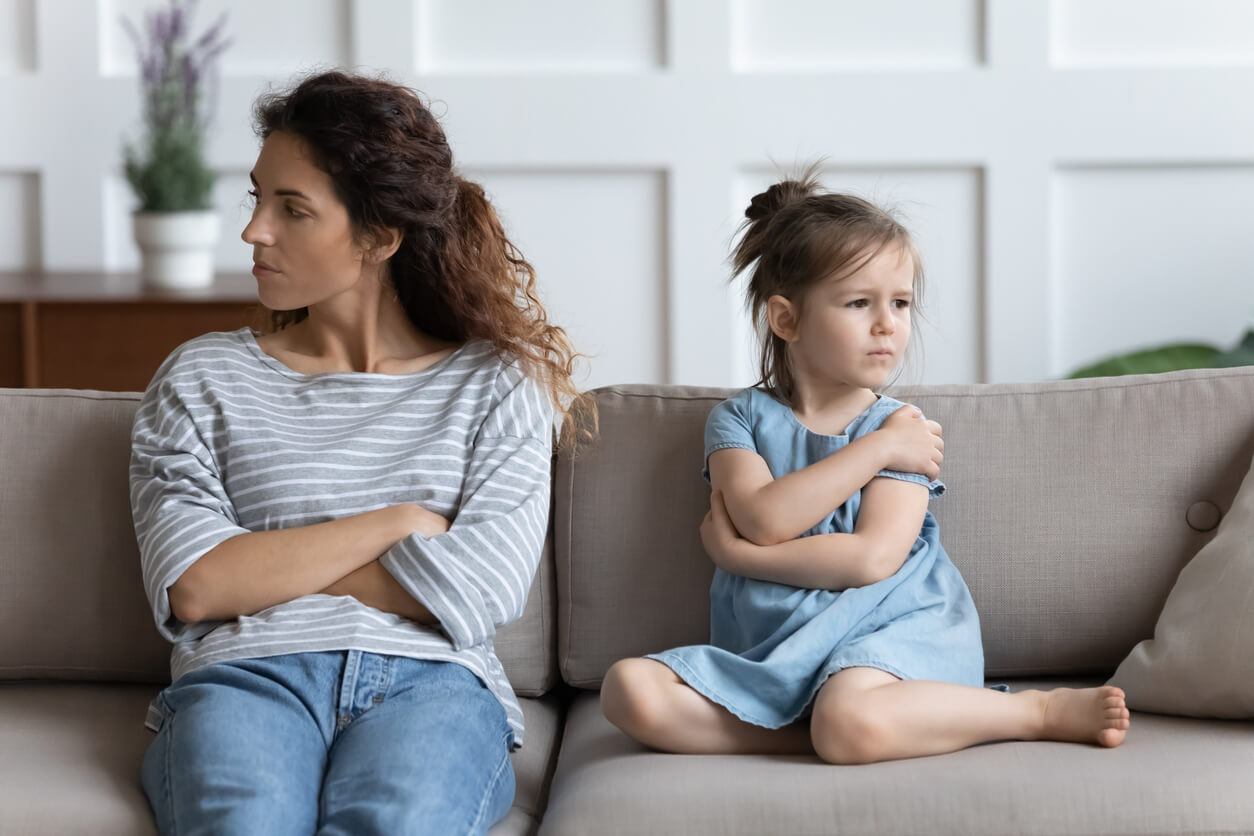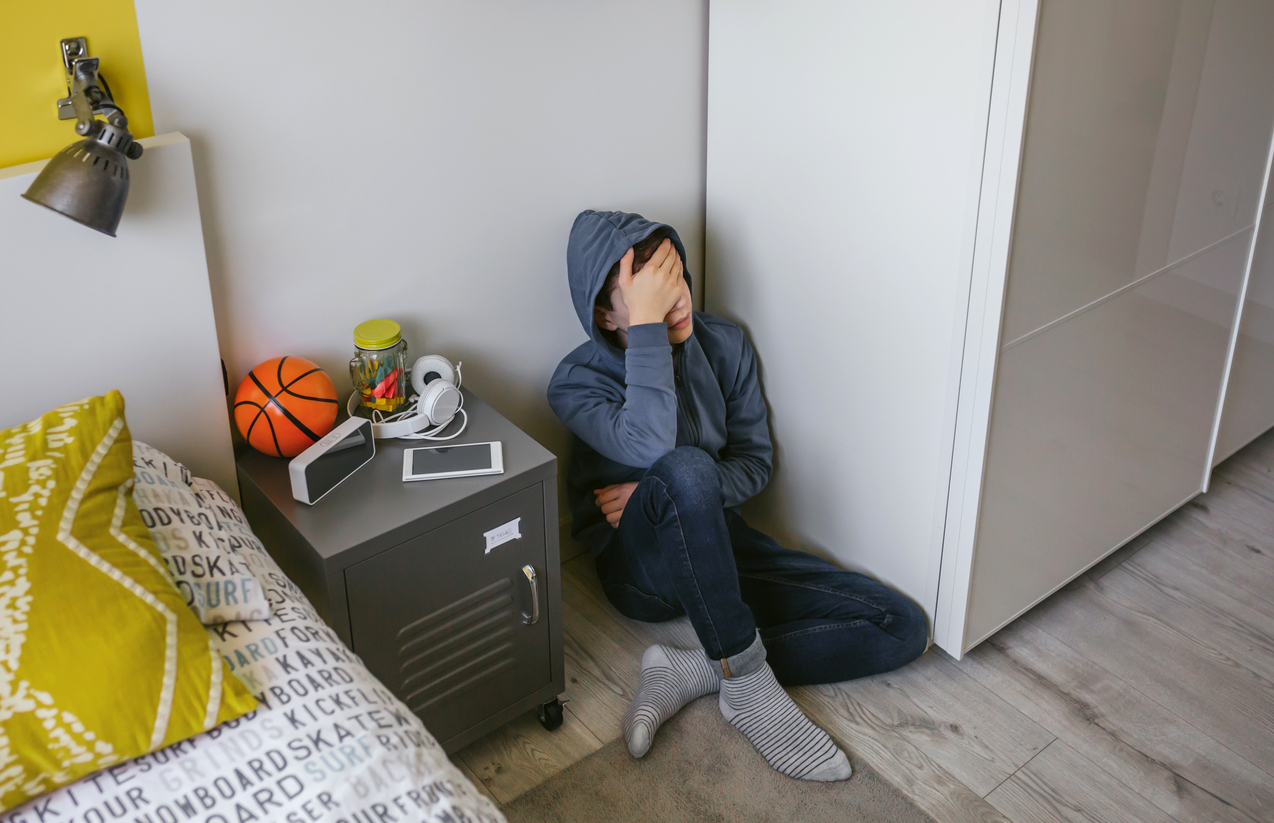Types of Psychological Violence that Affect Children


Written and verified by the psychopedagogue María José Roldán
When we talk about abuse, it’s not limited only to physical abuse, as psychological abuse also affects and destroys children. Psychological violence occurs in a subtle way, as it’s almost unnoticeable, but it spreads and reaches the soul of little ones. It’s a severe cruelty that appears almost in a normalized way, on many occasions, through humiliation, yelling, and indifference.
Psychological violence
Psychological mistreatment is also known as psychological or emotional abuse. When this occurs, a child is ridiculed, bullied, insulted, humiliated, or rejected. Unfortunately, this is more common than you might imagine. These attitudes usually come from parents toward their children and can cause them to develop self-esteem problems, insecurity, and violence.
Symptoms in children
There are symptoms to be taken into account in order to identify if a child suffers from psychological violence:
- Problems at school
- Academic problems
- Low self-esteem
- Eating problems
- Childhood depression
- Anxiety
- Inappropriate behavior
- Aggressiveness toward oneself or others
- Seeking approval no matter what
- Sleep problems
- Physical neglect

Violent attitudes from parents toward children
There are some attitudes that can be considered violent and that destroy children little by little. Sometimes, they can be subtle behaviors and parents aren’t even aware that they’re doing it. Sometimes they’re also unaware of how it can affect their children both in the short and long term. That’s why it’s so important to pay attention and not fall into this problem.
This type of violence should never be used with children, because they don’t deserve it. The most destructive damage to a child is when this abuse is formed slowly. That is, when it grows with details, moments, and emotional wounds that seem insignificant, but that hurt more than any blow.
Three types of psychological violence that destroy children
Next, we’re going to show you 3 types of psychological abuse that destroy children and that should never be applied under any circumstances. If you do, you should seek professional help as soon as possible, because you’re being destructive with your children.
1. Humiliation
If you humiliate your child, your little one will feel miserable. And the worst thing is that they’ll believe the cruel words you say to them. For example, if you constantly criticize them, insult them, accuse them falsely, or make derogatory remarks about them, this is humiliation. This is exercised both in public and in private. To avoid humiliating your child, you should keep the following in mind:
- Think about what you say before you say it
- Stop making hurtful comments to your child
- Never compare your child to others
- Stop criticizing them
- Start seeing the good things they do
- Become a good example and stop being their tormentor

2. Doubting the psychological health of the child
We’re talking about adults who think that their children have a mental or behavioral problem, when in fact it’s not true. But the adult’s belief causes them to treat them in this way and generates anxiety and confusion for the child. If, for example, an adult thinks the child is hyperactive when they’re not, just because they don’t know how to parent, they’ll be treated that way. And, perhaps, in reality, the child is just nervous.
Many times, parents make children believe that they have a problem when this isn’t the case at all. To prevent this from happening, it’s essential that you evaluate your parenting and change what isn’t working. Many times, the drawback lies in adult reactions and in ineffective parenting and discipline methods.
Social isolation
These parents border on toxic overprotection and choose everything for their children. They also decide when they go out and when they don’t, with whom they go out, and when they can see their friends and family. In this way, they prohibit contact with other people so that they depend exclusively on them, thus robbing them of their autonomy, freedom, and contact with the world. These minors live in a world that doesn’t exist, that is, in a reality fabricated by their parents.
Watch out for words and impulses
These are just three examples, but unfortunately, there are many more: Shouting, the silent treatment, cruel looks, etc. All of these can do much more harm than hitting on some occasions. Therefore, we must be aware that, as parents, we must be very careful with our words and impulses. Also, it’s crucial to control your anger and seek professional help if necessary.
When we talk about abuse, it’s not limited only to physical abuse, as psychological abuse also affects and destroys children. Psychological violence occurs in a subtle way, as it’s almost unnoticeable, but it spreads and reaches the soul of little ones. It’s a severe cruelty that appears almost in a normalized way, on many occasions, through humiliation, yelling, and indifference.
Psychological violence
Psychological mistreatment is also known as psychological or emotional abuse. When this occurs, a child is ridiculed, bullied, insulted, humiliated, or rejected. Unfortunately, this is more common than you might imagine. These attitudes usually come from parents toward their children and can cause them to develop self-esteem problems, insecurity, and violence.
Symptoms in children
There are symptoms to be taken into account in order to identify if a child suffers from psychological violence:
- Problems at school
- Academic problems
- Low self-esteem
- Eating problems
- Childhood depression
- Anxiety
- Inappropriate behavior
- Aggressiveness toward oneself or others
- Seeking approval no matter what
- Sleep problems
- Physical neglect

Violent attitudes from parents toward children
There are some attitudes that can be considered violent and that destroy children little by little. Sometimes, they can be subtle behaviors and parents aren’t even aware that they’re doing it. Sometimes they’re also unaware of how it can affect their children both in the short and long term. That’s why it’s so important to pay attention and not fall into this problem.
This type of violence should never be used with children, because they don’t deserve it. The most destructive damage to a child is when this abuse is formed slowly. That is, when it grows with details, moments, and emotional wounds that seem insignificant, but that hurt more than any blow.
Three types of psychological violence that destroy children
Next, we’re going to show you 3 types of psychological abuse that destroy children and that should never be applied under any circumstances. If you do, you should seek professional help as soon as possible, because you’re being destructive with your children.
1. Humiliation
If you humiliate your child, your little one will feel miserable. And the worst thing is that they’ll believe the cruel words you say to them. For example, if you constantly criticize them, insult them, accuse them falsely, or make derogatory remarks about them, this is humiliation. This is exercised both in public and in private. To avoid humiliating your child, you should keep the following in mind:
- Think about what you say before you say it
- Stop making hurtful comments to your child
- Never compare your child to others
- Stop criticizing them
- Start seeing the good things they do
- Become a good example and stop being their tormentor

2. Doubting the psychological health of the child
We’re talking about adults who think that their children have a mental or behavioral problem, when in fact it’s not true. But the adult’s belief causes them to treat them in this way and generates anxiety and confusion for the child. If, for example, an adult thinks the child is hyperactive when they’re not, just because they don’t know how to parent, they’ll be treated that way. And, perhaps, in reality, the child is just nervous.
Many times, parents make children believe that they have a problem when this isn’t the case at all. To prevent this from happening, it’s essential that you evaluate your parenting and change what isn’t working. Many times, the drawback lies in adult reactions and in ineffective parenting and discipline methods.
Social isolation
These parents border on toxic overprotection and choose everything for their children. They also decide when they go out and when they don’t, with whom they go out, and when they can see their friends and family. In this way, they prohibit contact with other people so that they depend exclusively on them, thus robbing them of their autonomy, freedom, and contact with the world. These minors live in a world that doesn’t exist, that is, in a reality fabricated by their parents.
Watch out for words and impulses
These are just three examples, but unfortunately, there are many more: Shouting, the silent treatment, cruel looks, etc. All of these can do much more harm than hitting on some occasions. Therefore, we must be aware that, as parents, we must be very careful with our words and impulses. Also, it’s crucial to control your anger and seek professional help if necessary.
All cited sources were thoroughly reviewed by our team to ensure their quality, reliability, currency, and validity. The bibliography of this article was considered reliable and of academic or scientific accuracy.
- Toro Trallero, J. (2021) Estrés, maltrato infantil y psicopatología. Editorial: Pirámide
This text is provided for informational purposes only and does not replace consultation with a professional. If in doubt, consult your specialist.








